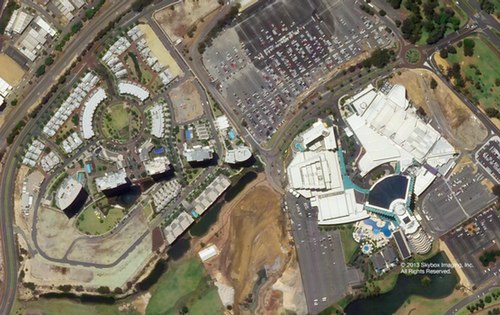
An image of the Crown Perth entertainment complex in Perth, Australia, taken by the SkySat-1 spacecraft in December, among the first images released by Skybox Imaging’s first satellite. That satellite will be joined by a fleet thanks to contracts with two major aerospace companies announced this month. (credit: Skybox Imaging)
Skybox Imaging, the commercial remote sensing company that plans to deploy a constellation of small satellites to provide high resolution images and high definition video of the Earth, is ramping up its plans to deploy that fleet of satellites. The company’s first satellite, SkySat-1, was built in-house and launched with about thirty other satellites on a Dnepr rocket last November from Russia. Now, the company is bringing in some well-known space companies to help build and launch those satellites, a departure not just for Skybox but also its partners.
Last week, Skybox and Space Systems/Loral (SS/L) announced a contract where SS/L will build 13 Skybox satellites for launch in 2015 and 2016. “By partnering with SSL, we can leverage their unique production capabilities to scale with greater cost-efficiency and speed while allowing us to focus on prototyping next generation systems to better serve our customers,” explained Skybox vice president Michael Trela in a release.
The arrangement is convenience for Skybox, not just because it frees them up from having o develop a satellite production line: SSL’s satellite manufacturing facility is in alo Alto, California, just up the 101 freeway from Skybox’s office’s in nearby Mountain View. For SSL, though, this is a expansion into a different class of satellite. The company—acquired in 2012 by Canadian company MDA—is best known for building large commercial communications satellites, weighing 6,000 kilograms or more. Each SkySat that SSL builds will weigh in at just 120 kilograms, with dimensions of 60 x 60 x 95 centimeters. “Based on SSL’s unique strengths as a satellite manufacturer and MDA’s heritage, we are developing new capabilities that will enable us to pursue other earth observation and LEO satellite opportunities in the U.S. and abroad,” SSL president John Celli said in a statement.
Yesterday, Skybox and Orbital Sciences Corporation announced a contract to launch at least some of those satellites. The contract covers the launch of six of those satellites on a Minotaur-C rocket from Vandenberg Air Force Base in California in late 2015. The contract, Orbital CEO David Thompson said in a statement, includes “options for additional launch services to support the development of Skybox’s business” beyond the one launch covered by the contract.
The Minotaur-C is a commercial version of Orbital’s existing Minotaur I rocket, placing the Minuteman ICBM motors used in the lower stages of the Minotaur with commercially-procured motors from ATK. (National space policy limits rockets that use retired ICBM motors to launching government-sponsored payloads, so as not to compete with commercially-developed vehicles.) Orbital has talked for some time about developing a commercial variant of the Minotaur to augment or even replace its existing Pegasus and Taurus rockets, and Thursday’s contract is the first announced award for the Minotaur-C.

Leave a Reply